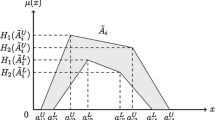Abstract
The problem of integrated project portfolio selection and scheduling (PPSS) is among the most important and highly pursed subjects in project management. In this study, a mathematical model and algorithm are designed specifically to assist decision makers decide which projects are to be chosen and when these projects are to be undertaken. More specifically, the PPSS problem is first formulated as a nonlinear multi-objective model with simultaneous consideration of benefit and risk factors. Due to the complexity and uncertainty involved in most real life situations, fuzzy numbers are incorporated into the model, which can provide decision makers with more flexibility. Then, an inverse modeling based multi-objective evolutionary algorithm using a Gaussian Process is presented to obtain the Pareto set. Finally, an illustrative example is used to demonstrate the high efficacy of the foregoing approach, which can provide decision makers with valuable insights into the PPSS process. The proposed algorithm is found to be more effective compared with two other popular algorithms.




Similar content being viewed by others
References
Hall NG, Long DZ, Qi J, Sim M (2015) Managing underperformance risk in project portfolio selection. Oper Res 63(3):660–675
Starkey A, Hagras H, Shakya S, Owusu G, Mohamed A, Alghazzawi D (2016) A cloud computing based many objective type-2 fuzzy logic system for mobile field workforce area optimization. Memet Comput 8(4):269–286
Zhang X, Ge B, Jiang J, Tan Y (2016) Consensus building in group decision making based on multiplicative consistency with incomplete reciprocal preference relations. Knowl Based Syst 106:96–104
Kitayama S, Yamazaki K (2012) Compromise point incorporating trade-off ratio in multi-objective optimization. Appl Soft Comput 12(8):1959–1964
Vetschera R, De Almeida AT (2012) A PROMETHEE-based approach to portfolio selection problems. Comput Oper Res 39(5):1010–1020
Tavana M, Keramatpour M, Santos-Arteaga FJ, Ghorbaniane E (2015) A fuzzy hybrid project portfolio selection method using data envelopment analysis, TOPSIS and integer programming. Expert Syst Appl 42(22):8432–8444
Morton A, Keisler JM, Salo A (2016) Multicriteria portfolio decision analysis for project selection. Multiple criteria decision analysis. Springer, New York, NY, pp 1269–1298
Jha P, Bali S, Kumar UD, Pham H (2014) Fuzzy optimization approach to component selection of fault-tolerant software system. Memet Comput 6(1):49–59
Hassanzadeh F, Nemati H, Sun M (2014) Robust optimization for interactive multiobjective programming with imprecise information applied to R&D project portfolio selection. Eur J Oper Res 238(1):41–53
Schaeffer S, Cruz-Reyes L (2016) Static R&D project portfolio selection in public organizations. Decis Support Syst 84:53–63
Sefair JA, Méndez CY, Babat O, Medaglia AL, Zuluaga LF (2017) Linear solution schemes for Mean-SemiVariance Project portfolio selection problems: an application in the oil and gas industry. Omega 68:39–48
Chen W, Lei L, Wang Z, Teng M, Liu J (2018) Coordinating supplier selection and project scheduling in resource-constrained construction supply chains. Int J Prod Res 56(19):6512–6526
Rostami S, Creemers S, Leus R (2018) New strategies for stochastic resource-constrained project scheduling. J Sched 21(3):349–365
Wang X, Ning Y (2018) Uncertain chance-constrained programming model for project scheduling problem. J Oper Res Soc 69(3):384–391
Leyman P, Vanhoucke M (2017) Capital-and resource-constrained project scheduling with net present value optimization. Eur J Oper Res 256(3):757–776
Esparcia-Alcázar AI, Almenar F, Vos TE, Rueda U (2018) Using genetic programming to evolve action selection rules in traversal-based automated software testing: results obtained with the TESTAR tool. Memet Comput 10(3):257–265
Yassine AA, Mostafa O, Browning TR (2017) Scheduling multiple, resource-constrained, iterative, product development projects with genetic algorithms. Comput Ind Eng 107:39–56
Xiong J, Leus R, Yang Z, Abbass HA (2016) Evolutionary multi-objective resource allocation and scheduling in the Chinese navigation satellite system project. Eur J Oper Res 251(2):662–675
Kumar M, Mittal M, Soni G, Joshi D (2018) A hybrid TLBO-TS algorithm for integrated selection and scheduling of projects. Comput Ind Eng 119:121–130
Perez F, Gomez T (2016) Multiobjective project portfolio selection with fuzzy constraints. Ann Oper Res 245:7–29
Tanaka H (1984) A formulation of fuzzy linear programming problem based on comparison of fuzzy numbers. Control cybern 3:185–194
Cheng R, Jin Y, Narukawa K, Sendhoff B (2015) A multiobjective evolutionary algorithm using Gaussian process-based inverse modeling. IEEE Trans Evol Comput 19(6):838–856
Karshenas H, Santana R, Bielza C, Larranaga P (2014) Multiobjective estimation of distribution algorithm based on joint modeling of objectives and variables. IEEE Trans Evol Comput 18(4):519–542
Liu H-L, Gu F, Zhang Q (2014) Decomposition of a multiobjective optimization problem into a number of simple multiobjective subproblems. IEEE Trans Evol Comput 18(3):450–455
Yang Z, Tang K, Yao X (2008) Large scale evolutionary optimization using cooperative coevolution. Inf Sci 178(15):2985–2999
Campigotto P, Passerini A, Battiti R (2014) Active learning of Pareto fronts. IEEE Trans Neural Netw Learn Syst 25(3):506–519
Cheng R, Jin Y, Olhofer M, Sendhoff B (2016) A reference vector guided evolutionary algorithm for many-objective optimization. IEEE Trans Evol Comput 20(5):773–791
Zhang Q, Li H (2007) MOEA/D: A multiobjective evolutionary algorithm based on decomposition. IEEE Trans Evol Comput 11(6):712–731
Deb K, Pratap A, Agarwal S, Meyarivan T (2002) A fast and elitist multiobjective genetic algorithm: NSGA-II. IEEE Trans Evol Comput 6(2):182–197
Rudnik K, Kacprzak D (2017) Fuzzy TOPSIS method with ordered fuzzy numbers for flow control in a manufacturing system. Appl Soft Comput 52:1020–1041
Wang H, Olhofer M, Jin Y (2017) A mini-review on preference modeling and articulation in multi-objective optimization: current status and challenges. Complex Intell Syst 3(4):233–245
Acknowledgements
This work was supported in part by the National Natural Science Foundation of China under Grants 71690233, 71501182, and 71571185. The authors would like to thank the editor and three anonymous reviewers for their constructive comments that helped us to improve the quality of this paper.
Author information
Authors and Affiliations
Corresponding author
Additional information
Publisher's Note
Springer Nature remains neutral with regard to jurisdictional claims in published maps and institutional affiliations.
Rights and permissions
About this article
Cite this article
Zhang, X., Hipel, K.W. & Tan, Y. Project portfolio selection and scheduling under a fuzzy environment. Memetic Comp. 11, 391–406 (2019). https://doi.org/10.1007/s12293-019-00282-5
Received:
Accepted:
Published:
Issue Date:
DOI: https://doi.org/10.1007/s12293-019-00282-5




